By Sharang Biswas
In his essay Nonlinearity and Literary Theory, Espen Aarseth humorously points out that literary scholars hold a peculiar disdain for the figure of the Reader of a text: “As an individual, this pale and uncontroversial character never mattered much to us critics anyway, and then only as a construct on which to hang the baser pleasures of the text; he is our poor and predictable cousin, slave to the rhythm, lost in the textual pleasure dome like the ball in a pinball machine.”
But roleplaying games…as texts, they’re weird aren’t they? RPGs, be they tabletop or live-action, are systems for creating stories. Who is the true author? How much of the role of an author does a player take on? Within the intersection of a TTRPG’s design intent and the player’s impulse to tell a story sits a strange mirror-maze where the question of “who is responsible for the player’s experience?” backtracks and loops in on itself. Every gamer knows that a good table can transfigure the meanest of designs into a glorious night of transformative storytelling. At the same time, a well-designed system of procedures can absolutely ignite an uninspired gamer’s creative spark.
Solo RPGs—especially those minimal with their mechanics and maximal in their prompt-driven storytelling—find themselves even more susceptible to this confusion. Is this a weak game or am I a bad writer? Am I just tired? Am I simply distracted by lizard-brain concerns such as the New York heat, my rumbling stomach, or my upcoming plans with friends?
These are questions that have all crossed my mind when playing various journaling games. And I’m specifically calling out journaling games as a specific sub-genre of solo RPGs. Mikey Ham’s Two Hand Path, for instance, is a solo RPG but not a journaling game: it’s a dice game that you play against the fickle forces of chance. Speak the Sky’s This Person Should Not Exist has you, for the most part, scouring the nooks and crannies of Where’s Waldo texts, creating only fragmentary bits of story; I wouldn’t call it a journaling game. Jack Harrison’s Koriko: A Magical Year is a journaling game. Daniel Bronson-Lowe’s The Librarian’s Apprentice is a journaling game. And Cassi Mothwin’s Tangled Blessings is certainly a journaling game.
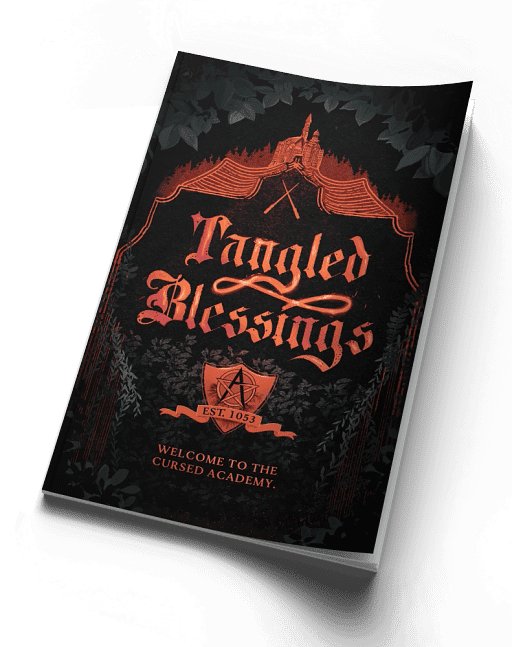
In his famed 1938 book Homo Ludens, Dutch historian Johan Huizinga’s argues that “Play…was so innate in poetry, and every form of poetic utterance so intimately bound up with the structure of play, that the bond between them was seen to be indissoluble.” Journaling RPGs serve as the quintessential distillation of this sentiment. Playing one such game is akin to an extended creative writing exercise.
The key question then, is what does Tangled Blessings offer players that elevates it above mere writing prompts? How does it employ both textual and gameplay elements to inflame the emotional kindling that drives us to tell stories?
Tangled Blessings places you in a dark and dangerous university of magic. The book oozes gothic vibes. Through an evocative use of page borders, illustrations, creative text layout, plus various diegetic quotes and notes (these latter two being especially salient in the game’s expansion Echoes of Lost Electives), the game yanks you into shadowy corridors, dusty libraries, and study halls thick with academic intrigue. Almost as soon as you open the book, for instance, you’re greeted with the deliciously ominous quote, “Surviving the trials of magic is simple. The trick is surviving everyone else.”
Once the tone is set, though, Tangled Blessings relies on its player to flesh out the rest of the world and story. It’s a slim volume, and though it does include some NPC creation tables, the text is light on worldbuilding. Designer Cassi Mothwin’s underlying assumption is obvious: in 2025, you probably have an idea of what the “magic school” genre involves. Heck, you might even have a magic-school-shaped hole in your heart following the very public devolution of a once-beloved children’s book author into a frothing, vitriolic transphobe. The reliance on this genre as a literary chassis however, creates a tension with the games ludic drive to create satisfying stories.
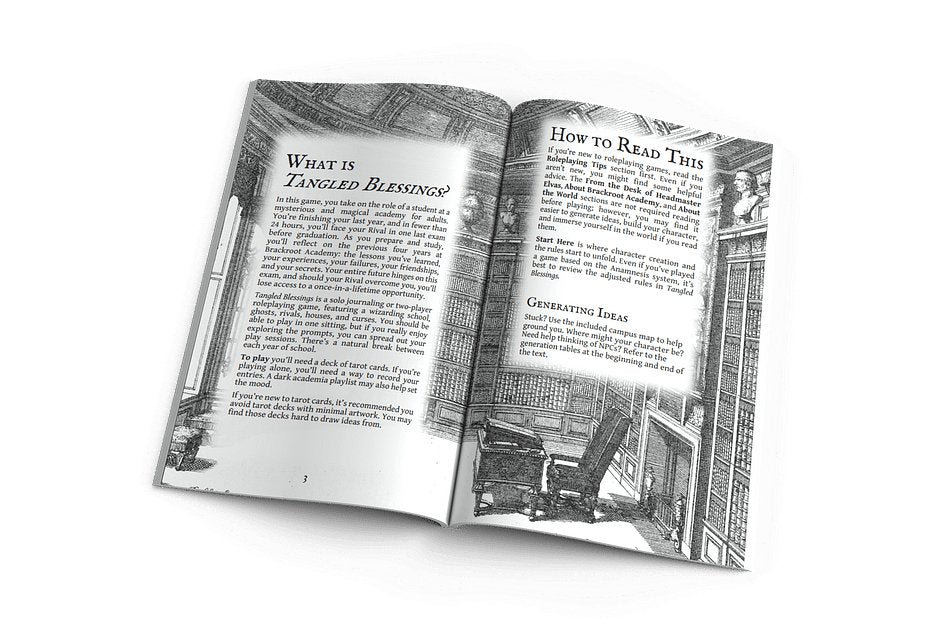
Notably, Tangled Blessings explicitly calls out Leigh Bardugo’s Ninth House and R.F Kuang’s Babel as inspirational sources. The “dark magical academia” settings that these two lauded novels create rely on an atmosphere of mystery. Mothwin does an admirable job of setting up intriguing and mysterious plot points. In the very first year for instance, you might be prompted as such: “Which ghosts haunted your study sessions? What lost mysteries did they carry? Were you afraid?” Juicy stuff. But what the game lacks is follow-through.
The world of Tangled Blessings is not a surreal or mythic one. It unambiguously traces its lineage back to a genre where actions and consequences are rooted in order and realism, despite the fantasy and horror tropes that might come into play. After all, a magic school amounts to little if the mundane threat of exams, broken hearts, and lost friendships are absent. The game should, ergo make it easy for players to create a grounded story with interesting character development and satisfying plot arcs.
Unfortunately, while the game sets up a series of strange, ominous, magical events, they yield little fruit by the end. Tangled Blessings never really prompts you to revisit any of the mysteries or plots you seeded earlier on. It sets a clipped pace with pointed questions and tarot card pulls, but leaves little room to really develop the answers to those questions. As a result, what should feel like a dense net of mysterious occurrences that hint at things to come or set up exciting conflicts instead becomes a series of isolated, disconnected events that, while providing a few avenues for character growth, do little to sustain any sort of plot. Even character creation choices feel a little lackluster. My character’s magical speciality and choice of school House—what of them? They never really turn up again.
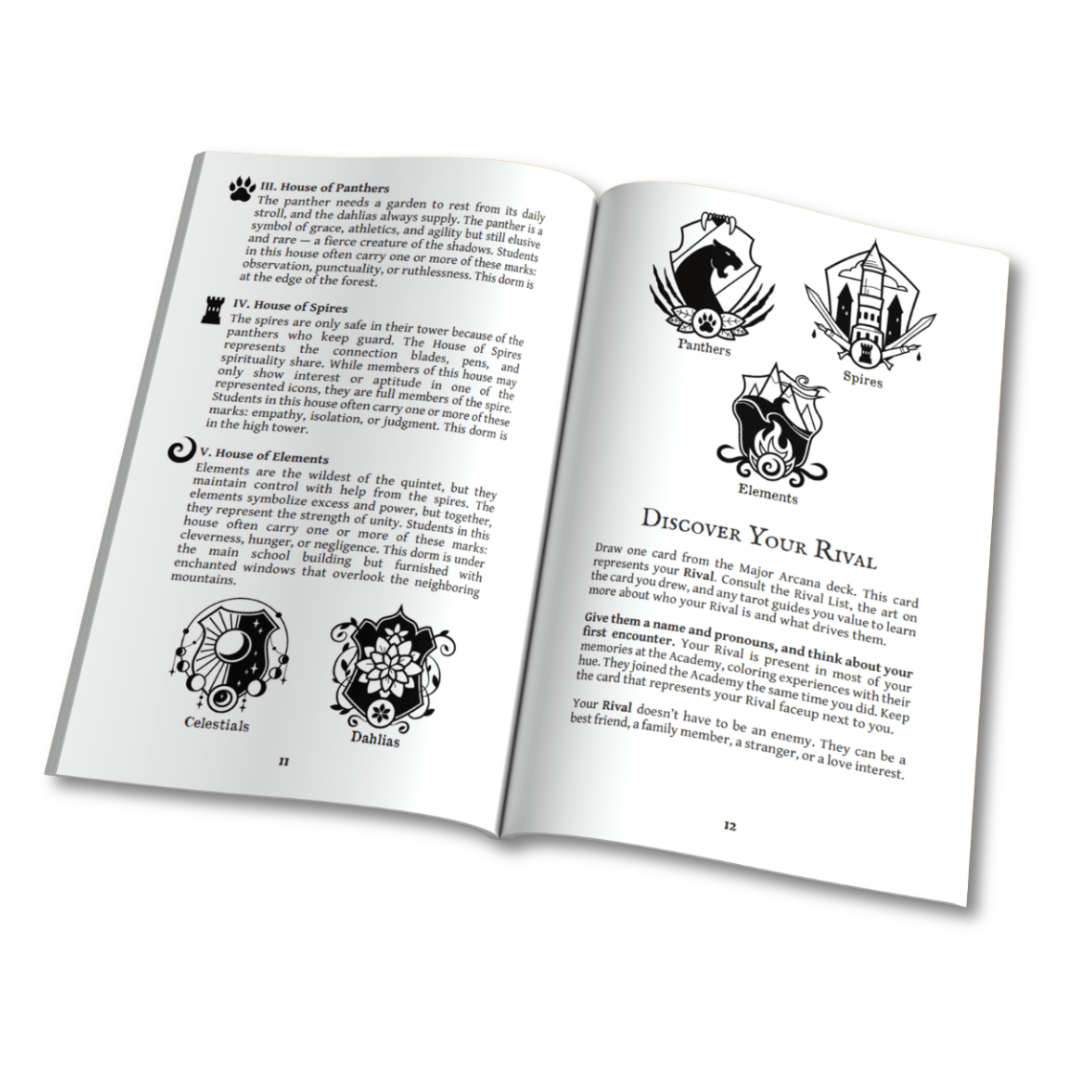
The finale, a duel with your rival, might be particularly egregious. To me, the ending was extremely anticlimactic. What about the soul I found and released earlier? What about the various strange deaths over the four years? What of all the portents, prophecies, cryptic warnings, wayward spells?
To be sure, all RPGs rely on players to fill in the gaps, to varying degrees. But journaling RPGs are more demanding on this score, and are thus expected to provide more crutches to players. Leaving such significant chunks of the story entirely up to the player with inadequate guidance eschews the fundamental affordances of roleplaying games as a medium; as a result, the creation of a satisfying story is that much more challenging. I could absolutely try to revisit plot elements and tie up loose threads on my own, but the game’s job is to make that easier (Or to provide a setting and tone where plot cohesion is less important, such as in games like Koriko or The Librarian’s Apprentice).
Where the writing lags, game mechanics should pick up the slack. Unfortunately, there too do we find an underutilized resource. In his article What Counts: Configuring the Human in Platform Studies, scholar Ian Bellomy underscores the power that human possesses when interacting with objects like cards and dice—we can manipulate them in unusual ways, we can see patterns, and we can assign symbol significance where once there might have been none.
For instance, many games take advantage of the affordances of cards to achieve interesting experiential effects. In The Librarian’s Apprentice, you lay out your cards in front of you to create a map of your exploration. In Koriko, you can choose to shuffle certain major arcana cards back into your deck, and re-encountering them furthers the story of important NPCs. In Becky Annison’s Wreck This Deck, you ritually and physically deface cards in a variety of ways for dark, demonic purposes.
Tangled Blessings employs tarot cards, but makes use of few, if any, of the powers Bellomy attributes to cards in the hands of humans. The minor arcana are used as little more than random number generators for a series of numbered lists, while the major arcana serve only as vague sources of inspiration for answers to prompts. While the game asks you to use a different tarot suit for card pulls for each year at school, no symbolic meaning is assigned to the suits; interchanging them would have no real effect. At the end of the game, the outcome of the duel is determined by sheer randomness: did you or your rival draw the higher card? At no point does the game ask you to manipulate the decks, choose between cards, replace or change cards. Interpreting tarot cards certainly conjures themes of the occult, of mystery, of personal quests, but here we see an echo of the same weakness that exists in the writing: aside from reinforcing the tone, the cards and card mechanics do little to ease the burden of creativity that falls on the shoulders of the player (and this is true even in the 2-player variant).
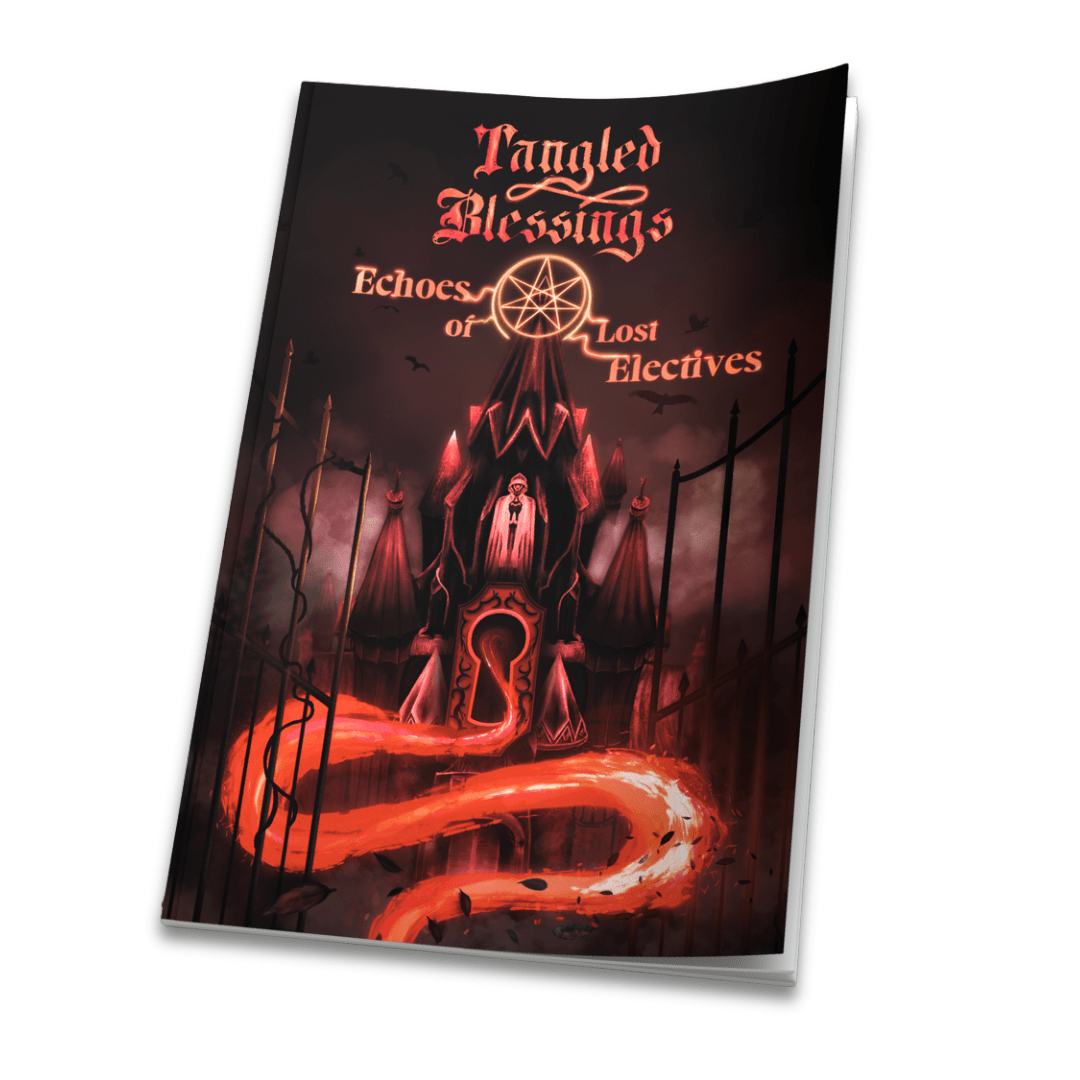
The Echoes of Lost Electives expansion solves one issue with the base game: it makes the choice of your house much more significant to your story. Aside from that, its new modules end up muddying the base’s game simplicity. The addition of shadowy Cults only serves to introduce even more mysteries and plots that players have to put in effort to integrate into their arcs; the same can be said about the new Third Year events. The new relationship meter for your rival is purely mechanical and entirely random: scant narrative advice is provided. The new endings sometimes feel disconnected from the actual workings of the duel, and often entirely arbitrary—random magical disasters with no links to your main story. “[These endings] may not exactly line up with the story you’ve told so far,” the text advises, continuing, “Feel free to ignore parts of the prompt and adjust where it makes sense.” Telling a player to simply ignore and adjust whatever they like…feels a little like a cop-out and places the intellectual burden squarely and entirely in the hands of the player.
Ultimately, Tangled Blessings is not a bad game. It’s a perfectly serviceable game that will help you tell a story of a gothic university of magic. And it will certainly be a moody story. The praise blurbs featured on the back of the book focus entirely on tone and atmosphere and they’re not wrong: the game does a good job of establishing a “beautiful and eerie” world that “doesn’t pull its punches”.
Whether or not it’s a satisfying story, however, depends a little too much on the player. A story cannot live on vibes alone. Instead of providing tools, Tangled Blessings relies almost exclusively on what the player brings to the table. If you’re predisposed to enjoying magic school, you’ll probably be charmed. If you want to put in the time and the work of figuring out a plot, of creating connections, callbacks and recurring characters, of solving a grand mystery, you’ll have a good time with the game. But one wonders how different that would be from simply writing a novel.
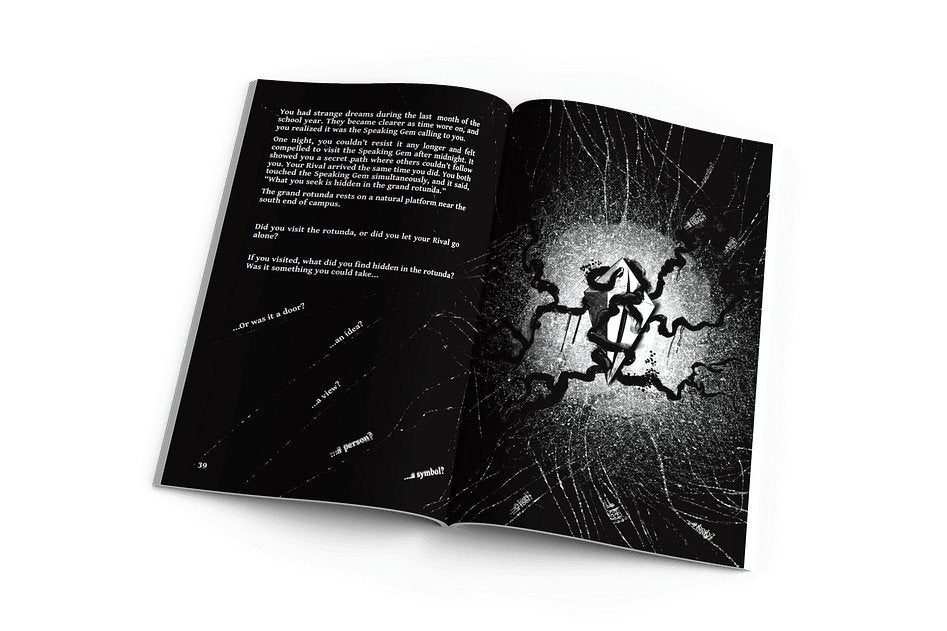
Sharang Biswas has won two IGDN awards, four Ennie Awards, an IndieCade award, and a Golden Cobra award for roleplaying games, as well as the Brave New Weird Award for fiction. He has showcased interactive works at institutions such as The Institute of Contemporary Art in Philadelphia, Pioneer Works in Brooklyn, the Toronto Reference Library, and The Museum of the Moving Image in Queens. He has worked on games such as Avatar: Legends, Pathfinder, Vampire: The Masquerade, Spire: The City Must Fall, Moonlight on Roseville Beach, Jiangshi: Blood on the Banquet Hall, and Dungeons & Dragons Live, as well as boardgames including Holi: Festival of Color, Mad Science Foundation, and Sea of Legends. His fiction and poetry has appeared in Lightspeed, Nightmare, Augur, Strange Horizons, Baffling, and more. He is the co-editor of Honey & Hot Wax: An Anthology of Erotic Art Games (Pelgrane Press) and the author of science-fiction novella The Iron Below Remembers (Neon Hemlock Press). Sharang currently teaches games at the NYU Game Center and Fordham University.
© 2025 Tabletop Bookshelf


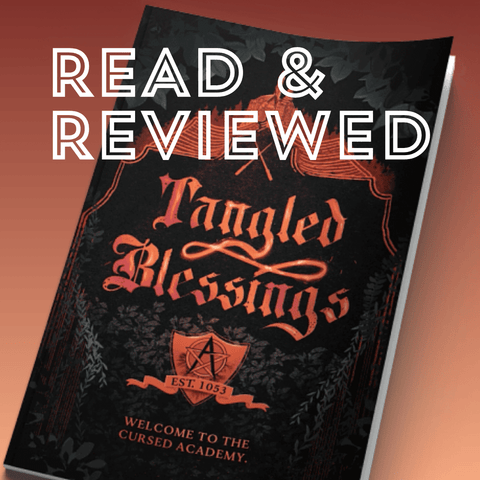
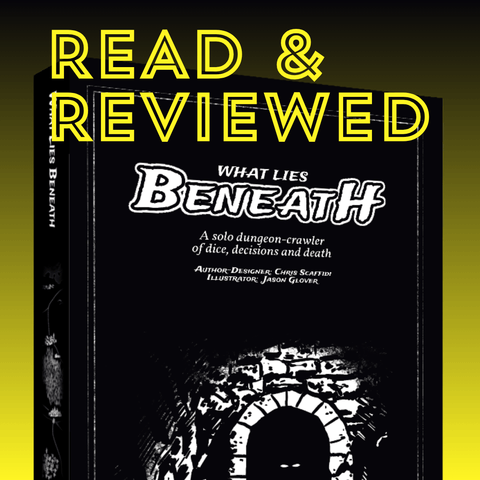

Comments (0)
There are no comments for this article. Be the first one to leave a message!